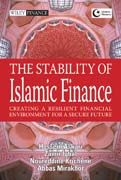
The stability of islamic finance: creating a resilient financial environment for a secure future
Iqbal, Zamir
Mirakhor, Abbas
The book's main focus is on the question of the sources of financial instability which seems inherent in the conventional system. As a core component of this focus, the book will consider episodes of turbulence and instability in a historical context recalling the occurrence of such events from mid-19th century to the present. It will present various theoretical explanations along with solutions and alternative financial systems that avoid instability provided byvarious scholars dating back to mid-19th century to present. The book then will present and discuss the architecture of an Islamic financial system and show that at its core, this system shares many characteristics of an stable financial system proposed by Western scholars throughout history to avoid the inherent instability of the present dominant system. Particular emphasis will be placed on the present financial crisis and its causes as well the financial crisis of the 1997 in Southeast Asia, Russia, and Latin America relating these episodes to the fundamental features of the dominant system. The debt crisis of the low income countries will also be part of this discussion. It will then argue that these crises could be mitigated under an Islamic system or any other system with similar architecture.DR. ZAMIR IQBAL works as Lead Investment Officer with the Quantitative Strategies, Risk and Analytics department in the Treasury of the World Bank in Washington, D.C. He earned his Ph. D. in international finance from the George Washington University, where he also serves as adjunct faculty of international finance. He has published several articles on Islamic finance in journals of repute and has presented papers at international forums. He has extensive experience with capital markets, structured products, risk management, financial sector development, and financial modeling. His research interests include IslamicFinance, Financial Engineering, Structured Finance and International Banking.He is co-author of Introduction to Islamic Finance: Theory and Practice (2007) and Risk Analysis for Islamic Banks (2007). DR. ABBAS MIRAKHOR, born in Tehran, Islamic Republic of Iran, attended Kansas State University, where he received his Ph. D. in economics in 1969. From 1969 to 1984, he taught in various universities in the U.S. and Iran. From1984 until 1990, he served on the staff of thief, and from 1990 to 2008, he served as the Executive Director for Afghanistan, Algeria, Ghana, Islamic Republic of Iran, Morocco, Pakistan, and Tunisia on the Executive Board of the IMF. Dr. Mirakhor is the co-author of Essays on Iqtisad: Islamic Approach to Economic Problems (1989), Theoretical Studies in Islamic Banking and Finance (1987), and Introduction to Islamic Finance: Theory and Practice (2007).He has received several awards including Order of Companion of Volta for service to Ghana, conferred by the President of Ghana in 2005; Islamic Development Bank Annual Prize for Research in Islamic Economics, shared with Mushin Khan in2003, and Quaid-e Azam star for service to Pakistan,conferred by the President of Pakistan in 1997. NOUREDDINE KRICHENE works as Economist at the IMF. He previously served as Advisor at the Islamic Development Bank in Jeddah. He has written extensively on energy economics, macroeconomic theories and on international trade and finance. He earned his Ph D in Economics from the University of California, Los Angeles, in 1980.
- ISBN: 978-0-470-82519-8
- Editorial: John Wiley & Sons
- Encuadernacion: Cartoné
- Páginas: 256
- Fecha Publicación: 22/03/2010
- Nº Volúmenes: 1
- Idioma: Inglés
